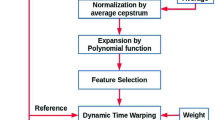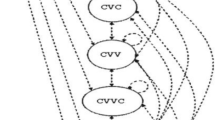Abstract
Automatic speaker recognition systems have a foundation built on ideas and techniques from the areas of speech science for speaker characterization, pattern recognition and engineering. In this chapter we provide an overview of the features, models, and classifiers derived from these areas that are the basis for modern automatic speaker recognition systems. We describe the components of state-of-the-art automatic speaker recognition systems, discuss application considerations and provide a brief survey of accuracy for different tasks.
This work was sponsored by the Department of Justice under Air Force Contract FA8721-05-C-0002. Opinions, interpretations, conclusions, and recommendations are those of the authors and are not necessarily endorsed by the United States Government.
Preview
Unable to display preview. Download preview PDF.
Similar content being viewed by others
References
Davis, S.B., Mermelstein, P.: Comparison of parametric representations for monosyllabic word recognition in continuously spoken sentences. IEEE Trans. Acoust. Speech, Signal Processing, ASSP 28(4), 357–366 (1980)
Quatieri, T.: Discrete-Time Speech Signal Processing: Principles and Practice. Prentice-Hall, Englewood Cliffs (2001)
Reynolds, D.A., Quatieri, T.F., Dunn, R.: Speaker verification using adapted Gaussian mixture models. Digital Signal Processing 10(1-3), 19–41 (2000)
Tierney, J.: A study of LPC analysis of speech in additive noise. IEEE Trans. Acoust., Speech, Signal Processing, ASSP 28(4), 389–397 (1980)
Rabiner, L., Juang, B.-H.: Fundamentals of Speech Recognition. Prentice-Hall, Englewood Cliffs (1993)
Adami, A., Mihaescu, R., Reynolds, D.A., Godfrey, J.J.: Modeling prosodic dynamics for speaker recognition. In: Proc. ICASSP, pp. IV–788–IV–791 (2003)
Peskin, B., Navratil, J., Abramson, J., Jones, D., Klusacek, D., Reynolds, D., Xiang, B.: Using prosodic and conversational features for high-performance speaker recognition: Report from JHU workshop. In: Proc. ICASSP (2003)
Doddington, G.: Speaker recognition based on idiolectal differences between speakers. In: Proc. Eurospeech, pp. 2521–2524 (2001)
Navrátil, J., Jin, Q., Andrews, W.D., Campbell, J.P.: Phonetic speaker recognition using maximum-likelihood binary-decision tree models. In: Proc. ICASSP, pp. IV–796–IV–799 (2003)
Matsui, T., Furui, S.: Concatenated phoneme models for text-variable speaker recognition. In: Proc. ICASSP, vol. II, pp. 391–394 (1993)
Campbell, W.M., Campbell, J.P., Reynolds, D.A., Jones, D.A., Leek, T.R.: Phonetic speaker recognition with support vector machines. In: Thrun, S., Saul, L., Schölkopf, B. (eds.) Advances in Neural Information Processing Systems 16, MIT Press, Cambridge (2004)
Andrews, W.D., Kohler, M.A., Campbell, J.P., Godfrey, J.J., Hernandez-Cordero, J.: Gender-dependent phonetic refraction for speaker recognition. In: Proc. ICASSP, pp. I149–I153 (2002)
Bimbot, F., Bonastre, J.-F., Fredouille, C., Gravier, G., Meignier, S., Merlin, T., Ortega-Garc, J., Magrin-Chagnolleau, I., Petrovska-Delacretaz, D., Reynolds, D.A.: A tutorial on text-independent speaker verication. EURASIP Journal on Applied Signal Processing 4, 430–451 (2004)
Reynolds, D.A.: Speaker identification and verification using gaussian mixture speaker models. Speech Commun. 17(1-2), 91–108 (1995)
Carey, M., Parris, E., Bridle, J.: A speaker verification system using alpha-nets. In: Proc. ICASSP (1991)
Dempster, A., Laird, N., Rubin, D.: Maximum likelihood from incomplete data via the EM algorithm. Journal of the Royal Statistical Society 39, 1–38 (1977)
Gauvain, J.-L., Lee, C.-H.: Maximum a posteriori estimation for multivariate Gaussian mixture observations of markov chains. IEEE Trans. Speech and Audio Processing 2(2), 291–298 (1994)
Duda, R.O., Hart, P.E.: Pattern Classification and Scene Analysis. Wiley and Sons, New York (1973)
Soong, F., Rosenberg, A., Rabiner, L., Juang, B.: A vector quantization approach to speaker recognition. In: Proc. ICASSP, pp. 387–390 (1985)
Rosenberg, A., Soong, F.: Evaluation of a vector quantization talker recognition system in text independent and text dependent modes. In: Proc. ICASSP, pp. 873–876 (1986)
Campbell, W.M.: Generalized linear discriminant sequence kernels for speaker recognition. In: Proc. ICASSP, pp. 161–164 (2002)
Fine, S., Navrátil, J., Gopinath, R.A.: A hybrid GMM/SVM approach to speaker recognition. In: Proc. ICASSP (2001)
Wan, V., Renals, S.: SVMSVM: support vector machine speaker verification methodology. In: Proc. ICASSP, pp. 221–224 (2003)
Campbell, W.M., Campbell, J.P., Reynolds, D.A., Jones, D.A., Leek, T.R.: High-level speaker verification with support vector machines. In: Proc. ICASSP, pp. I–73–76 (2004)
Stolcke, A., Ferrer, L., Kajarekar, S., Shriberg, E., Venkataraman, A.: MLLR transforms as features in speaker recognition. In: Proc. Interspeech, pp. 2425–2428 (2005)
Campbell, W.M., Sturim, D.E., Reynolds, D.A., Solomonoff, A.: SVM based speaker verification using a GMM supervector kernel and NAP variability compensation. In: Proc. ICASSP, pp. I–97–I–100 (2006)
Cristianini, N., Shawe-Taylor, J.: Support Vector Machines. Cambridge University Press, Cambridge (2000)
Collobert, R., Bengio, S.: SVMTorch: Support vector machines for large-scale regression problems. Journal of Machine Learning Research 1, 143–160 (2001)
Louradour, J., Daoudi, K., Bach, F.: SVM speaker verification using an incomplete cholesky decomposition sequence kernel. In: IEEE 2006 Odyssey: The Speaker and Language Recognition Workshop (2006)
Mariéthoz, J., Bengio, S.: A max kernel for text-independent speaker verification systems. In: Second Workshop on Multimodal User Authentication (2006)
Soong, F.K., Rosenberg, A.E.: On the use of instantaneous and transitional spectral information in speaker recognition. In: Proc. ICASSP, pp. 877–880 (1986)
Matsui, T., Furui, S.: Speaker recognition using concatenated phoneme models. In: Proc. ICSLP (1992)
Rosenberg, A.E., Parthasarathy, S.: Speaker background models for connected digit password speaker verification. In: Proc. ICASSP, pp. 81–84 (1996)
Corrada-Emmanuel, A., Newman, M., Peskin, B., Gillick, L., Roth, R.: Progress in speaker recognition at dragon systems. In: Proc. ICSLP (1998)
Weber, F., Peskin, B., Newman, M., Corrada-Emmanuel, A., Gillick, L.: Speaker recognition on single- and multispeaker data. Digital Signal Processing 10, 75–92 (2000)
Rabiner, L.R., Juang, B.H.: An introduction to hidden markov models. IEEE ASSP Mag. 3 (1986)
Rabiner, L.R.: A tutorial on hidden Markov models and selected applications in speech recognition. Proc. of the IEEE 77(2), 257–285 (1989)
Campbell, J.P.: Speaker recognition: A tutorial. Proc. of the IEEE 85(9), 1437–1462 (1997)
Newman, M., Gillick, L., Ito, Y., McAllaster, D., Peskin, B.: Speaker verification through large vocabulary continuous speechrecognition. In: Proc. ICSLP (1996)
Matsui, T., Furui, S.: Likelihood normalization for speaker verification using phoneme- and speaker-independent model. In: Speech Communication (1995)
Farrell, K.R., Mammone, R.J., Assaleh, K.T.: Speaker recognition using neural networks and conventional classifiers. IEEE Trans. on Speech and Audio Processing 2(1), 194–205 (1994)
Bishop, C.M.: Neural Networks for Pattern Recognition. Oxford University Press, Oxford (1995)
Oglesby, J., Mason, J.: Radial basis function networks for speaker recognition. In: Proc. ICASSP, pp. 393–396 (May 1991)
Hermansky, H., Morgan, N., Bayya, A., Kohn, P.: Compensation for the effect of communication channel in auditory-like analysis of speech (RASTA-PLP). In: Proc. Eurospeech, pp. 1367–1371 (1991)
Atal, B.: Effectiveness of linear prediction characteristics of the speech wave for automatic speaker identification and verification. Journal of the Acoustical Society of America 55(6), 1304–1312 (1974)
Mansour, D., Juang, B.: A family of distortion measures based upon projection operation for robust speech recognition. IEEE Trans. Acoust., Speech, Signal Processing, ASSP 37, 1659–1671 (1989)
Pelecanos, J., Sridharan, S.: Feature warping for robust speaker verification. In: Proc. of Speaker Odyssey Workshop, pp. 213–218 (2001)
Reynolds, D.A.: Channel robust speaker verification via feature mapping. In: Proc. ICASSP, vol. 2, pp. II–53–56 (2003)
Teunen, R., Shahshahani, B., Heck, L.: A model-based transformational approach to robust speaker recognition. In: Proc. ICSLP (2000)
Kenny, P., Boulianne, G., Dumouchel, P.: Eigenvoice modeling with sparse training data. IEEE Trans. Speech and Audio Processing 13(3), 345–354 (2005)
Vogt, R., Baker, B., Sriharan, S.: Modelling session variability in text-independent speaker verification. In: Proc. Interspeech, pp. 3117–3120 (2005)
Solomonoff, A., Campbell, W.M., Boardman, I.: Advances in channel compensation for SVM speaker recognition. In: Proc. ICASSP (2005)
Auckenthaler, R., Carey, M., Lloyd-Thomas, H.: Score normalization for text-independent speaker verification systems. Digital Signal Processing 10, 42–54 (2000)
Reynolds, D.A.: Comparison of background normalization methods for text independent speaker verification. In: Proc. Eurospeech, pp. 963–966 (1997)
Heck, L., Weintraub, M.: Handset-dependent background models for robust text-independent speaker recognition. In: Proc. ICASSP, pp. 1071–1074 (1997)
Campbell, W.M., Navratil, J., Reynolds, D.A., Shen, W., Sturim, D.E.: The MIT/IBM 2006 speaker recognition system:High-performance reduced complexity recognition. In: ICASSP (2007)
Reynolds, D.A., Campbell, W., Gleason, T., Quillen, C., Sturim, D., Torres-Carrasquillo, P., Adam, A.: The 2004 MIT Lincoln Laboratory speaker recognition system. In: ICASSP (2005)
Author information
Authors and Affiliations
Editor information
Rights and permissions
Copyright information
© 2007 Springer-Verlag Berlin Heidelberg
About this chapter
Cite this chapter
Sturim, D.E., Campbell, W.M., Reynolds, D.A. (2007). Classification Methods for Speaker Recognition. In: Müller, C. (eds) Speaker Classification I. Lecture Notes in Computer Science(), vol 4343. Springer, Berlin, Heidelberg. https://doi.org/10.1007/978-3-540-74200-5_16
Download citation
DOI: https://doi.org/10.1007/978-3-540-74200-5_16
Publisher Name: Springer, Berlin, Heidelberg
Print ISBN: 978-3-540-74186-2
Online ISBN: 978-3-540-74200-5
eBook Packages: Computer ScienceComputer Science (R0)




